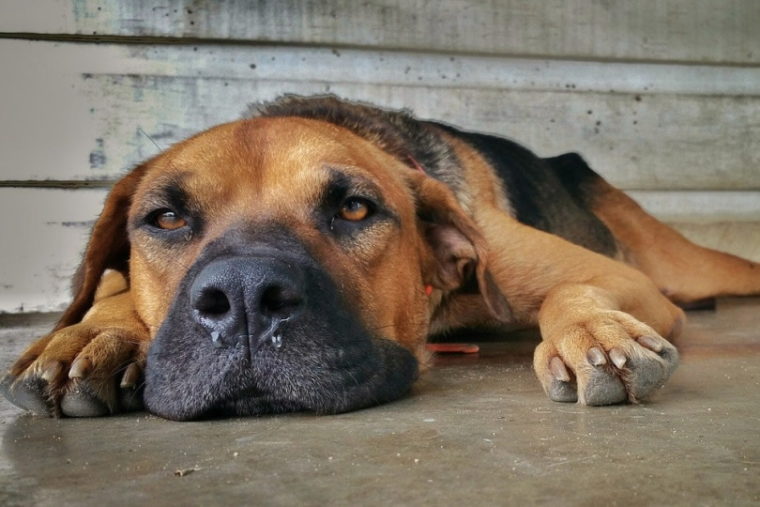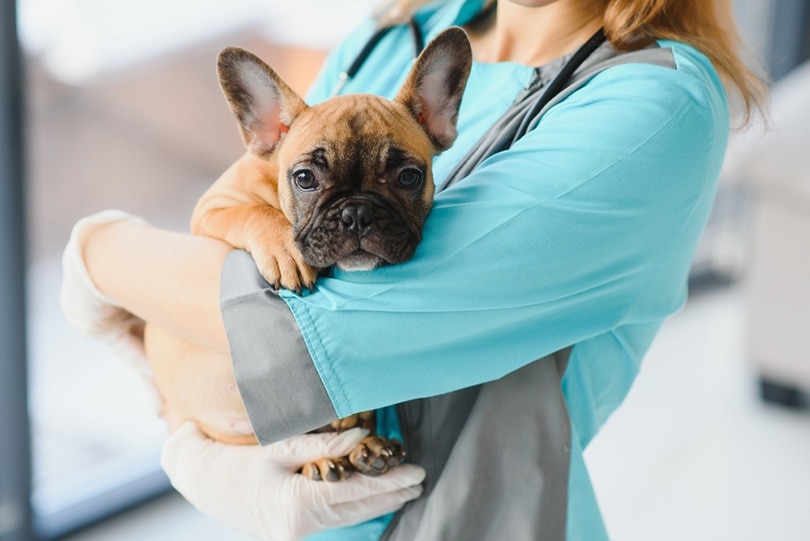
Just like in people, a dog’s nose may run for several reasons. Most of these reasons are not extremely serious; however, if your dog has just developed a runny nose, a trip to the vet is essential to get to the bottom of the problem. Some conditions may not need immediate treatment, while others may warrant tests and specific medications. In either case, a quick intervention will avoid major problems for your dog.
How do you tell the difference? By speaking to your vet and looking at other signs of illness.It helps to have a complete understanding of what can cause a runny nose and look for other signs of illness. Below, we’ll describe several of the most common reasons a dog may have a runny nose. Of course, as explained, it’s always best to call your vet whenever your dog develops any signs of illness.
The 6 Reasons Why My Dog’s Nose Is Running
1. Allergies
Just like humans, dogs can get seasonal allergies, which lead to signs like runny noses. This is usually called allergic rhinitis. Seasonal allergies are one of the most common causes of a mildly runny nose. Allergies can also cause signs like sneezing, coughing, itchiness, and eye discharge. Canine allergy and human allergy signs are quite similar.
The best way to treat allergies is to avoid allergies in the first place; however, this is easier said than done. If you know what your dog is allergic to, which is not always that straightforward, your best option is to avoid the trigger. Most cases of an allergy-related runny nose in dogs are caused by seasonal pollens or year-round house dust and molds. You probably cannot eliminate your dog’s exposure to pollen, for instance.
Your vet can give you tips on how to minimize the presence of dust and molds at home and how to help your dog in case of seasonal allergies. Some tips may include cleaning your dog’s eyes, paws, and fur when they come back from their walk. Depending on the severity of your dog’s allergies, your vet may also prescribe a range of different medications to help control your dog’s allergy signs. Antihistamines, immunosuppressants, steroids, and other medications can all help reduce allergy symptoms.
2. Anatomy
Brachycephalic breeds can suffer from respiratory issues—Pugs and Bulldogs fall into this category. These canines may have a runny nose because of the way their face is built. Brachycephalic breeds have short snouts and flat faces. They suffer from a condition called brachycephalic obstructive airway syndrome (BOAS) which causes a range of breathing issues, including nasal discharge. Their nasal passages are more prone to irritation, inflammation, and obstruction, which causes a runny nose.
If you live with a brachycephalic dog, it is important to watch them closely and work in close relationship with your vet to understand the signs of respiratory distress. Your vet is your go-to professional for tailored advice. If your dog just shows mild signs of BOAS, here are a few ways to help them:

3. Foreign Bodies
If your dog gets something stuck in their nose, it may run as a result of the inflammation and damage that the object is causing. Common obstructions include things like foxtails and grass awns. Signs of a foreign body may include sneezing, pawing at the nose, mucoid nasal discharge, and nose bleeds. Typically, your dog will be obviously distressed by something in their nose, but other dogs don’t seem to care much at all.
If you think your dog has something in their nose, you should take them to the vet immediately. In most cases, you won’t be able to see the object but you may see your dog constantly sneezing and quite distressed. Depending on where the object is lodged, your vet may need to perform a light sedation to remove the foreign object or get your dog under anesthesia and use endoscopy, a thin tube with a tiny camera and forceps attached. Luckily, dogs usually recover quickly from this procedure.
4. Infections
Many types of infections can cause breathing problems, including a runny nose. Bacterial, fungal, and viral infections all fall in this category. Even nasal parasites are a possibility. If you think your dog is suffering from a respiratory infection, you should contact your vet immediately.
Upper respiratory tract infections always carry the risk of turning into a lung infection, so it’s vital to get treatment as soon as possible. In addition to nasal discharge, your dog will probably exhibit other signs of a respiratory infection. For instance, coughing, sneezing, wheezing, nosebleeds, pawing at the nose, lethargy, lack of appetite, and difficulty breathing. How exactly the infection is treated depends on the cause.

5. Polyps and Tumors
Sneezing, blood, and mucoid nasal discharge can all be signs of nasal polyps or nasal tumors. Polyps are benign overgrowths of tissue. Tumors are sometimes benign, but they can also be cancerous. Therefore, a biopsy is often necessary.
Other signs of these problems include difficulty breathing, bulges in the nose, lack of appetite, weight loss, and lethargy. Your dog may breathe noisily or have trouble breathing at all. Nasal tumors are usually diagnosed with a combination of imaging such as radiography, CT scan, or MRI and analyzing a sample of the tissue.
Treatment depends on the nature of the lump. Your vet can inform you about the best options for your dog’s situation. Therapy can consist on radiation or chemotherapy, or involve surgery.
6. Abnormal Nose-Mouth Communication
Abnormal communication between the oral cavity and the respiratory tract, such as oro-nasal fistulas and cleft palate, may cause runny nose due to the access of food and liquids entering the respiratory tract.
A cleft palate is a congenital abnormality or a birth defect of a dog’s mouth where incomplete fusion of the palate occurs resulting in direct communication between the nose and the mouth.
Depending on the age of the dog and the size of the communication, a corrective surgery can be done. However, if the puppy is too young for an operation, supportive care such as assisted feeding is used while waiting for the animal to be ready for the said surgery.
Final Thoughts
These are some of the most common problems that can cause a dog’s nose to run. However, other less common problems may also cause excessive discharge.
If your dog’s nose suddenly starts running badly, you should take your dog to the vet. The tests that your vet may recommend and the treatment your vet prescribes largely depend on the extent of the problem and the general condition of your pup.
If your dog’s nose is just dripping clear fluid intermittently, your vet may recommend monitoring or prescribing some anti-allergy medication. However, if the discharge is continuous, thick, colored, or bloody, your vet may likely need to investigate the problem further or prescribe some stronger medication to get your dog back on track. It is always advisable to consult your vet if your dog has a runny nose. The sooner you find out what is going on with your furry friend, the better.
Featured Image Credit: RonaldPlett, Pixabay








